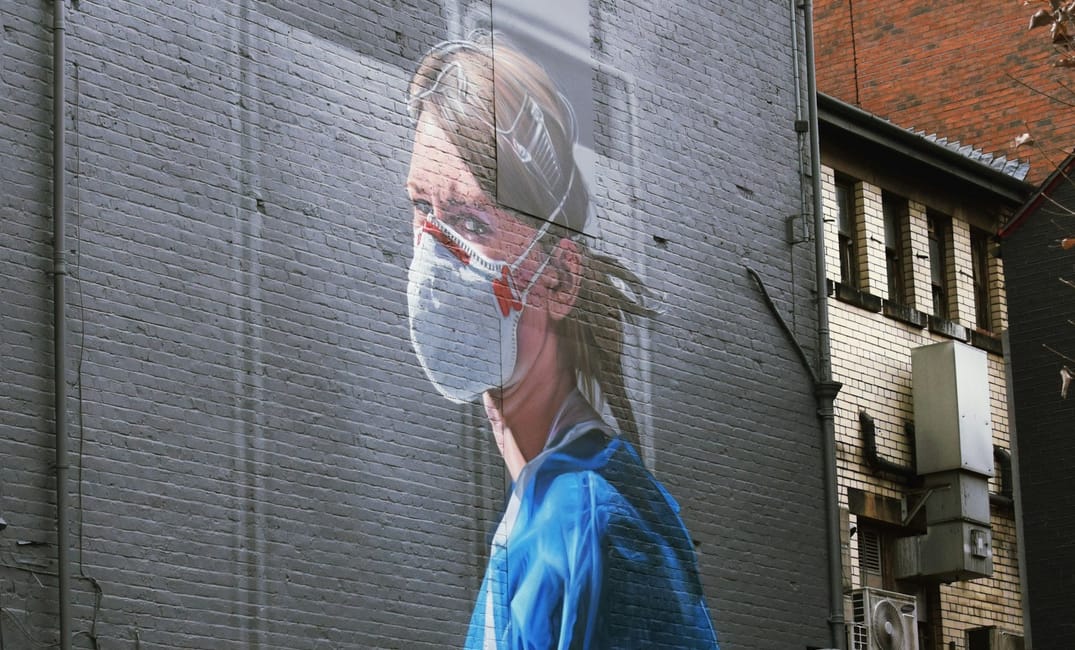✏️ Holly Rowe
The Covid-19 outbreak has resulted in an unprecedented scale of change. Forced into a restrictive national lockdown, the majority of the UK population are living shallow versions of their former lives, isolated from their places of work, education and family and friends.
In sharp contrast, healthcare workers have been plunged into an apocalyptic nightmare, facing augmented pressure, gruelling shift patterns, and are first-hand witnesses to the grim rising death toll in the UK (33,998 at the time of writing).
Naturally, many of us at home are seeking meaningful and respectful ways to show gratitude to our #NHSheroes. There has been an outpouring of support across the United Kingdom, as communities rally together to show their appreciation.
Heartwarming examples of individual gestures and local businesses stepping in include Yorkshire residents sewing scrubs for their local hospitals, high fashion houses producing vital PPE masks and Michelin starred restaurants delivering meals to Welsh hospitals. It has also produced more bizarre tributes, including street art murals (from Shoreditch, Coventry, Redcar and beyond) statues (Exmoor), and even creative lawn-mowing in Wales.
Such gestures of goodwill have served not only to boost healthcare workers’ morale but have also proven cheerful viewing for many confined to their homes. However, it seems not all of this support is genuine. Last week, eagle-eyed twitter users drew attention to a serious blunder by fast-fashion brand Oh Polly.
Lara Harper, a nursing student at Glasgow Caledonian who had been drafted in early to support her local NHS trust on the frontline took to Twitter to denounce the brand’s shocking response after she won a competition exclusively for NHS workers, promising a new outfit and care package as a thanks for their hard work.

The Oh Polly competition, initially launched on their Instagram page teased its followers: “Been working super hard over the pandemic and wanna join our virtual cocktail party with some of your fave influencers?” offering as a prize to “3 lucky winners an outfit of their choice, plus a care package full of ingredients and treats”.
As a frontline nurse, Lara entered, and was thrilled to win. However, after disclosing that she would be unable to attend the ‘virtual cocktail party’, as she was working a 12 hour hospital shift Oh Polly withdrew her care package and the offer of an outfit.

Lara posted a series of revealing screenshots to Twitter, showing direct messages from the brand backtracking, claiming that the actual prize was being able to join the Zoom event, and the care package was uniquely necessary for partaking (rather than a reward for her efforts on the frontline). They rounded off their rejection to Lara with a hollow sounding ‘thanks for all your hard work!!!’.

Understandably, Twitter users were outraged. They highlighted the blatant hypocrisy of the sentiment behind the competition- which failed to accommodate the shift patterns of a genuine NHS worker on the frontline, and left a young trainee nurse feeling disappointed. Many users vowed never to use ‘Oh Polly’ again, and noted the patronising and insincere tone of messages that repeatedly used ‘sorry babe’.
One savvy commentator tweeted ‘This isn’t a competition. This is a marketing opportunity, they’re basically giving out care packages and clothing in exchange for content’ (@slightgem). Another echoed these sentiments, claiming that the brand were only attempting to improve their image and boost sales.

These commentators touch upon an important characteristic of modern society. We are living in a time which places huge emphasis on visual culture, visibility and brand awareness. Traditional advertising channels such as TV, newspaper and magazines are in decline, with young fashion brands such as Oh Polly, PLT and Boohoo etc targeting their young following on social media, through dedicated brand accounts and chosen ‘influencers’.
Instagram remains the favoured outlet, but its image focused format and lack of accountability leaves us oblivious to the story and indeed intention behind an image. Carefully curated grids showcasing airbrushed influencers adorning their captions with hospital emojis and the NHS heros hashtag seem to fly in the face of the grim reality faced by frontline workers.
This leads us to another debate- are even well-intentioned social media tributes an acceptable way to support the cash-strapped and under-resourced NHS? In a recent appearance on BBC’s Question Time, Richard Horton from Lancet slammed the ‘hypocrisy’ of clapping NHS workers whilst those on the frontline remain woefully underequipped. He labelled the lack of governmental support ‘a national scandal’.
Indeed, whilst the sentiment of many of these social media tributes may be well placed, they may simply not be enough. Thanks to successive Conservative governments, the NHS has endured a decade of austerity, constant fighting over wages, and has lost over 150 of its own staff to Covid-19. NHS workers do not need clapping emojis, twitter mentions, or hashtags. They need PPE, lunch breaks, and a pay rise.
When this is all over, and we emerge from lockdown into a Covid-free world, perhaps we can arm ourselves with a greater sense of social, political and economic justice. We owe it to those who have kept our society ticking over to consume consciously- choosing brands who align themselves with decent values, and most importantly using our political voices to ensure the NHS finally receives the funding and attention it so desperately needs- and deserves.
Thanks for reading our article! We know young people’s opinions matter and really appreciate everyone who reads us.
Give us a follow on Instagram, Twitter and Facebook to stay up to date with what young people think.

